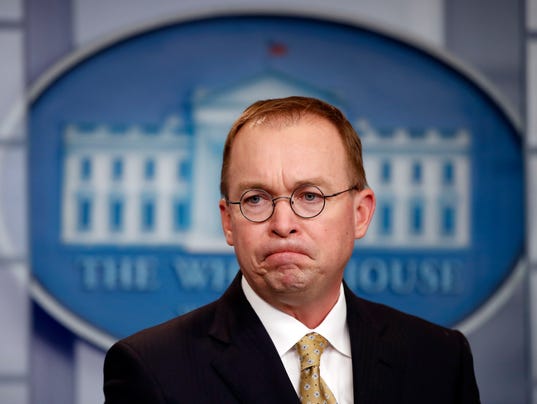Trump's budget will ask Congress not to spend all the money from cap-busting spending deal
Gregory Korte, USA TODAY Published 2:17 p.m. ET Feb. 11, 2018 | Updated 5:17 p.m. ET Feb. 11, 2018
The House has narrowly passed a sweeping bipartisan budget accord, ending an hours-long government shutdown and clearing a path for huge spending increases for both the Pentagon and domestic programs. The Senate passed the measure earlier Friday. (Feb. 9) AP
(Photo: Alex Brandon, AP)
CONNECTTWEETLINKEDIN 16 COMMENTEMAILMORE
WASHINGTON — The 2019 budget that President Trump will send to Congress Monday will attempt to "bend the trajectory down" on trillion-dollar budget deficits — even after Trump agreed to eliminate the spending caps in a budget deal last week, White House budget director Mick Mulvaney said Sunday.
"Just because this deal was signed does not mean the future is written in stone. We do have a chance still to change this trajectory and that's what the budget will show," Mulvaney told Fox News Sunday.
Trump's second budget proposal, to be released Monday, could be among the most important policy blueprints of his administration. His first budget proposal, coming just weeks into his administration, was portrayed largely as a placeholder — despite its proposals for deep cuts in domestic spending.
But now, Trump's 2019 budget has been overtaken by events even before it's off the printing press.
Mulvaney's office has been working for months based on the assumption that spending caps first imposed in the 2011 Budget Control Act would remain intact. With those assumptions now blown up, budget drafters scrambled over the weekend to update to its budget requests for this year and the next.
The budget deal Trump signed on Friday aborted an overnight shutdown by authorizing nearly $400 billion in additional spending over the next 19 months: $163 billion Republicans wanted for the military, $130 billion Democrats wanted for domestic spending, and $100 billion for emergencies.
Trump said Friday he was forced to agree to those terms "in order to finally, after many years of depletion, take care of our military."
Mulvaney's comments Sunday could be seen as a White House attempt to reneg on that compromise, but the budget director emphasized that the compromise doesn't directly spend any money beyond the next six weeks.
Congress has already passed five short-term spending bills in the 2018 fiscal year. It will have to pass another by March 23 to keep the government open through Sept. 30.
"What we're doing is, is saying, look, you don't have to spend all of this money. These are spending caps. They're not spending floors. So, you don't have to spend all that," Mulvaney said.
Last year, Trump proposed the elimination of 62 specific government programs. But the inability of Congress to agree on a long-term spending bill resulted in short-term measures that largely put spending on auto-pilot.
Trump will also include a number of policy proposals in the budget, including:
► Infrastructure: The budget will lay out details of how Trump wants to spend his proposed $200 billion infrastructure package. Trump will highlight that proposal Monday in a meeting at the White House with state and local officials.
► Civil Service: Trump wants to overhaul the federal workforce by giving Cabinet secretaries the power to fire poor performers and reward their best employees with bonuses.
► Drug prices: The administration will make several modest proposals to curb prescription drug prices. A report by the White House Council of Economic Advisers Friday recommends changing some Medicaid rules on rebates for low-income patients, reclassifying drug therapies administered in the doctor's office, increasing the leverage insurance companies have to negotiate drug prices, and enhancing competition.

No comments:
Post a Comment